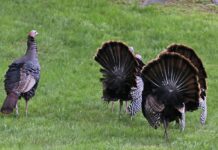I don’t know about the rest of you, but I have had more than enough of the year 2020. At this point, whatever the next four months of 2020 brings, it is what it is, we will just deal with it.
Now I am not going to write anything about the “virus” or politics, because I am tired of hearing about those things. But I am going to talk about some things that I have noticed happening with land and agriculture.
People are afraid that they are not going to have food to eat. I say this because of what happened earlier in the year. When grocery store shelves were empty, meat processing facilities were shut down, milk had to be dumped out at the farm, vegetables rotting in the fields, and families that needed these products having no way to get them.
So what effect did this have? We saw more yards with vegetable gardens in them around town and pots of vegetables instead of flowers on front porches. You couldn’t buy a freezer anywhere not to mention the limit on the pounds of seed potatoes you could purchase. Right now, go try and buy some canning jars and lids — good luck!
Small homesteads
One thing that has seemed to increase during this time is small homestead purchases. Homesteads with 10 acres and even more with five or less acres are becoming more and more popular and selling very well these days. People are wanting more control over the food supply for their family. So they are purchasing and moving to these small acreages to have that garden, raise that steer and pig, and collect the eggs from those chickens, all to feed their family.
Unfortunately, those few acres can be damaged very quickly during a drought if they are not managed properly. A dry spell can limit a pasture’s forage output, and it makes those plants more sensitive to overgrazing and tramping from hooves. A lack of rain can also increase the weed population in your pastures that compete with your grasses.
Small acreage facts. These pastures are too small to be a main feed source for grazing animals, but they can provide some nutrition and exercise Allowing animals unlimited access to these small pastures can severely damage the grasses. Try to adhere to the following suggestions:
- Only allow animals on these pastures for short periods of time.
- Animals should not be allowed to graze pastures that are shorter than 3 to 4 inches.
- Every small acreage homestead needs a “sacrifice area” if they are going to raise grazing animals. Basically, it is a dry lot where hay and water is provided to those animals when they can not be out on the pastures because they need to regrow
Following are some tips for managing small acreage pastures:
- Preserve the roots of your pasture grasses; they are essential for maintaining soil stability and erosion control.
- Avoid overgrazing, it has damaging effects both above and below ground to the plants.
- Even though the pastures are small don’t forget to do soil testing and apply lime and/or fertilizer when necessary.
- Graze pastures when grasses are 6 to 8 inches or above.
- Restrict the amount of time animals are allowed on small pastures per day. I have two horses with two small fields. My horses are allowed 2 to 3 hours per day out in those fields; the rest of the time or if it is raining they are confined to the lot with access to hay and water.
- Always control the weeds; during a drought weeds seem to be stronger at surviving then some of our pasture grasses, so it is very important that we control them either by spraying or mowing.
- Reseeding or renovating pastures is another option depending on the extent of the drought damage.
If you have questions about small acreage farming/homesteading contact your local OSU Extension office. While all of us are not back in the office full time yet, we are still just a phone call or email away.













